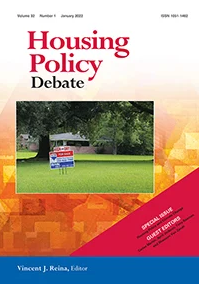Exploring Climate Change in U.S. Housing Policy
Housing is an established channel for U.S. climate policy. Local and national environmental policymakers have attempted to mitigate the contributions of home energy use and residential sprawl to the greenhouse gas emissions that cause global climate change for almost a half-century. More recently, hazard and planning officials are also exploring how to adapt housing to the multiple environmental effects that are already being realized as a consequence. But how is contemporary housing policy responding to the opportunities and needs of the climate crisis? The wide terrain of housing policy—including local land-use regulations, public subsidies for affordable housing production and maintenance, direct aid to households for their housing costs, the enforcement of fair housing laws, and the promotion of secure and affordable lending institutions among many relevant policy interventions—has struggled with integrating climate mitigation and adaptation strategies for a host of reasons. Resource constraints abound. Housing policymakers continue to focus on other persistent challenges such as the housing affordability crisis. The challenge of integrating climate response in this already complex social, economic, and environmental system may even be overwhelming. This special issue of Housing Policy Debate explores the ways in which the range of contemporary housing-relevant policy addresses climate change or, as the submissions suggest, ignores it.

